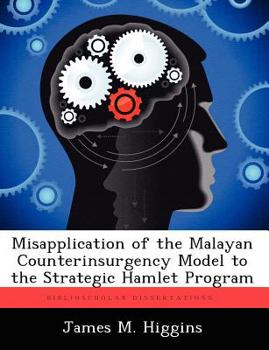Misapplication of the Malayan Counterinsurgency Model to the Strategic Hamlet Program
The strategic hamlet program in Vietnam was destined to failure because of a misapplication of the Malayan counterinsurgency model. The ethnic composition of the population, the nature of the... This description may be from another edition of this product.
Format:Paperback
Language:English
ISBN:124937295X
ISBN13:9781249372950
Release Date:September 2012
Publisher:Biblioscholar
Length:98 Pages
Weight:0.42 lbs.
Dimensions:0.2" x 7.4" x 9.7"
Customer Reviews
0 rating





